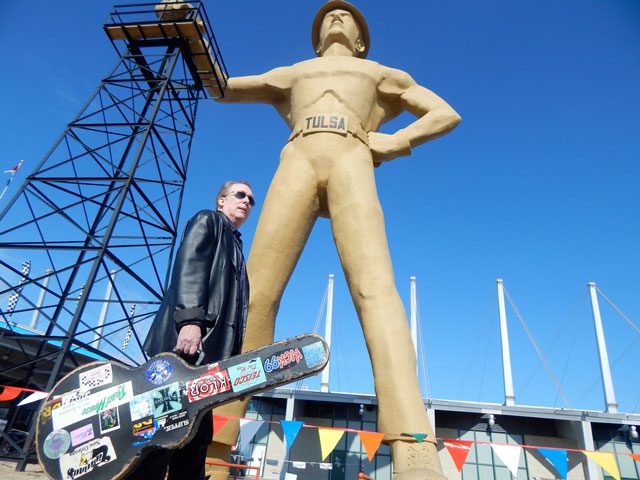
[dropcap]Anyone[/dropcap] who’s regularly visited this column knows I especially enjoy sharing stories about projects that put veteran Oklahoma musicians in the spotlight. The history of rock ’n’ roll is so short, relatively speaking, that some of its first practitioners are still making music, and when that happens with acts around here, it’s a good reason for celebration, or at least observance.
Tulsan Scott Ellison, I hasten to add, isn’t one of those First Rockers. He has, however, been making music for a good long while. According to my files, the first time I wrote about him was in 1988, just after he released his debut single. By that time, he’d been living in Southern California for about five years, working on his own blues-oriented music and touring extensively with a reconstituted version of the 1960s hitmakers the Box Tops. Before that, he spent the better part of a decade playing the Tulsa club scene.
Eventually, Ellison returned home, and he’s continued to tour and record, making noise as a blues-based artist regionally and nationally ever since. His new disc, Sanctified, is due out May 6 from Connecticut-based Red Parlor Records. Because of a deal between Red Parlor and RED Distribution, a Sony company, this disc, according to Ellison, “kind of kicks everything up for us. It’s really going to help make everything more global.”
What that potential global audience gets with Sanctified is not only a singer-songwriter-guitarist at the top of his game, but a stellar supporting cast of Tulsa musicians, including, to tie back to the first paragraph, some stars from the dawn of T-town rock ’n’ roll.
“Junior Markham’s playing harmonica on like three songs, Chuck Blackwell’s playing drums on the first track, and Jimmy Karstein’s on percussion on one song,” says Ellison, citing three musicians in that influential first wave of rockers who came out of Tulsa clubs and headed to Los Angeles to ply their trade in the late ’50s and early ’60s, eventually leaving their marks on the national scene.
Sanctified also features contributions from well-known Tulsans who established their rock ’n’ roll credentials a bit later, like drummers David Teegarden and Ron McRorey, keyboardist Walt Richmond, bassist Gary Gilmore, guitarist Charles Tuberville, and singers Chris Campbell and Marcy Levy, the latter a former Tulsa resident living in Southern California.
In addition to Ellison’s touring band – bassist Matt Kohl and drummer Robbie Armstrong – other musicians heard on Sanctified include Hank Charles, Jon Glazer and Danny Timms on keyboards; Brad Absher on guitar; bassist Jon Parris; drummer Tim Smith; and horn players Steve Ham and Mike Bennett. The late Ron Martin’s bass playing even shows up on one of the cuts via a track recorded years ago that Ellison reworked for the new disc.
Ellison’s long been known for using top Tulsa musicians on his records. But this time, he says, he went all in.
“I used even more of the Tulsa guys on this one,” he says, “a lot of the guys I’ve played with for the past 45 years.”
He laughs.
“I’m dating myself there, but there’s no other way to say it. These are the favorite guys I’ve played with and looked up to, people like Walt and Charles and Marcy and Chuck and Gary Gilmore. It’s basically Scott Ellison with the Tulsa all-stars,” he says. “The greatest of the greats are on this record, and that’s how I wanted it to be. I wanted to use everyone. It’s a taste of all the best guys I’ve played with in my life, and that’s kind of a cool thing.”
Also noteworthy is the presence of another top Tulsa act on the album, if only in spirit. Ellison’s fellow bluesman Steve Pryor, who died exactly a year before Sanctified’s scheduled release, is represented by one of the songs Pryor recorded on his first major-label disc, 1991’s Steve Pryor Band.
“It’s called ‘Last Breath,’ which is song No. 10, the last song, on that record,” Ellison says. “A bunch of us played that song at the Steve Pryor tribute show [June 4, 2016, at Cain’s Ballroom in Tulsa]. I had that CD and loved that song. I thought it was tailor-made for me – just the way it was constructed. It was in my key to sing, and the slide [guitar] thing on it was perfect. It’s one I wished I would’ve written.
“So we did it on the gig, and it went so well that I said, ‘Guys, you know, we’ve got to record this.’ It came out really well; I think it’s one of the strongest tunes on the record, and it’s the only time I did somebody else’s tune, one I didn’t write. I dedicated the record to Steve Pryor.”
All of the songs on that 1991 Pryor disc, including “Last Breath,” were co-written by the Pryor band members with Scott Hutchison, who’s also been a collaborator of Ellison’s for some time. Hutchison adds to his substantial list of recorded compositions with several co-written songs on Sanctified, as do Richmond, Tuberville and Campbell. Richmond was the producer of Ellison’s previous record on Red Parlor, Elevator Man, which rose to No. 22 on Living Blues magazine’s national airplay chart.
“Walt had such a great approach to Elevator Man,” says Ellison. “He said, ‘You need a straight blues record,’ so that’s what we did. Then, to follow it up, we did this one, which is more of a group effort. There are four producers on it, and I didn’t want it to look like a Britney Spears record, so I came up with ‘produced by “Rett.”’”
If you take a look at the list of collaborators on Sanctified, including Ellison himself, and note the first initials of four of their last names, the mysterious “Rett” becomes less of a mystery. But don’t let that get around.
“I want somebody in Germany to go, ‘Hey, this Rett guy, he’s really a good producer. We’ve got to get him over here to produce this record for us,’” says Ellison with another laugh. “I’d like to kind of create an illusion, keep the mystery going.”
Meanwhile, there’s the record itself to promote and the jobs to play. And while Ellison’s been promoting discs and playing gigs for decades, the chart success of his previous CD and the involvement of the giant Sony Corporation in Sanctified seem to have boosted him to the next level.
“You know how crazy it is in the music business,” he says. “It’s so insane. But we’re seeing things happen faster. For example, some of the places I’ve played before are now giving us national-act nights when we tour. We’re starting to get treated more like a headliner.
“It’s a gradual climb. It’s a slow process, but while I have the opportunity with Red Parlor and the Sony situation I’m going to use it. It’s kind of bizarre because your nose is to the grindstone, you’re working and working and working, and all of a sudden things are happening faster. You’re working so hard that you don’t realize it sometimes, but then all of a sudden something good comes in and you think, ‘Well, that’s because of the Sony thing.’
“In blues, in the music business, there’s no guarantee. But this is a good lift for me.”

























